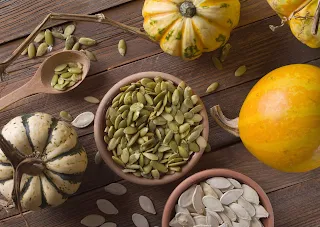What are the benefits of eating pumpkin seeds?
Introduction.
Pumpkin seeds,
also known as pepita (Mexican Spanish: pepita de zucchini, "little pumpkin
seeds") in North America, are edible seeds of pumpkin or other varieties
of squash. The seeds are usually flat, asymmetrical ovals, with a white outer
shell that turns light green when the shell is removed.
Some pumpkin
varieties are skinless and are grown exclusively for their edible seeds. The
seeds are rich in nutritional value and calories and are particularly rich in
fat (particularly linoleic
and oleic acid), protein, dietary fiber, and numerous micronutrients.
Pumpkin seeds refer to shelled grains or whole-shelled seeds but are most
commonly the finished roasted product used as a snack.
Rich in essential nutrients.
Pumpkin
seeds are packed with essential nutrients, making them a great addition to any
diet. They are particularly rich in magnesium,
manganese, phosphorus, and copper, which play crucial roles in various
bodily functions, including bone health, energy production, and immunity.
An abundant source of healthy fats.
Despite
their small size, pumpkin seeds are an abundant source of healthy fats,
including monounsaturated
and omega-3 fatty acids. These facts are known for their heart-healthy
properties and may help reduce the risk of cardiovascular disease when consumed
as part of a balanced diet.
Prostate health supporter.
Helps with sleep regulation.
These
seeds are a natural source of tryptophan, an
amino acid that helps in the production of serotonin, a neurotransmitter that
promotes relaxation and improves mood. Consuming pumpkin seeds may contribute
to better sleep quality and overall mood regulation.
Possible anti-inflammatory effects.
Studies
suggest that compounds found in pumpkin seeds may have anti-inflammatory
properties, which may help reduce inflammation
in the body. This makes them a possible addition to the diet of people who
suffer from inflammatory conditions such as arthritis.
Versatile culinary use.
Pumpkin seeds are not only nutritious but also incredibly versatile in the kitchen. They can be enjoyed as a healthy snack, sprinkled on salads, added to baked goods, or incorporated into granola or trail mixes. Its nutty flavor and crunchy texture can enhance the flavor and nutritional value of many dishes.
Potential blood sugar regulation.
Some
research indicates that compounds in pumpkin seeds may help regulate blood
sugar levels. Incorporating them into meals can contribute to better blood
sugar control, especially in individuals who suffer from insulin resistance or diabetes.
Conclusion.
From
their rich nutritional profile to their potential health benefits, pumpkin
seeds stand out as a source of benefits. Whether you choose to snack on them, incorporate
them into your meals, or use them as a topping, these seeds can contribute
significantly to your overall well-being. Enjoy the remarkable benefits of
pumpkin seeds and let their natural benefits enrich your diet and lifestyle.
Certainly! Here is a simple recipe
for roasted pumpkin seeds.
Ingredients.
·
Pumpkin seeds.
·
Salt to taste).
·
Olive oil or melted
butter.
Optional seasonings.
Paprika,
garlic powder, cayenne pepper, or any other seasoning you prefer for flavor.
Instructions.
Preheat
the oven to 300°F (150°C).
Open
the pumpkin and remove the seeds. Remove the pulp and seed strands and rinse
them well in a colander under cold water.
Dry
the seeds with paper towels.
In a
bowl, mix the seeds with a little olive oil or melted butter. Make sure to coat
them evenly.
Spread
the seeds in a single layer on a baking sheet. Sprinkle salt and any other
seasonings you like over the seeds.
Roast
the seeds in the preheated oven for about 30 to 40 minutes or until golden
brown, stirring occasionally to ensure even roasting.
Remove
from the oven and let cool before enjoying.
Has this conversation been helpful so far?
Kindly share your valuable advice


.jpg)
.png)
.jpg)
.jpg)
.jpg)

.jpg)


Comments
Post a Comment